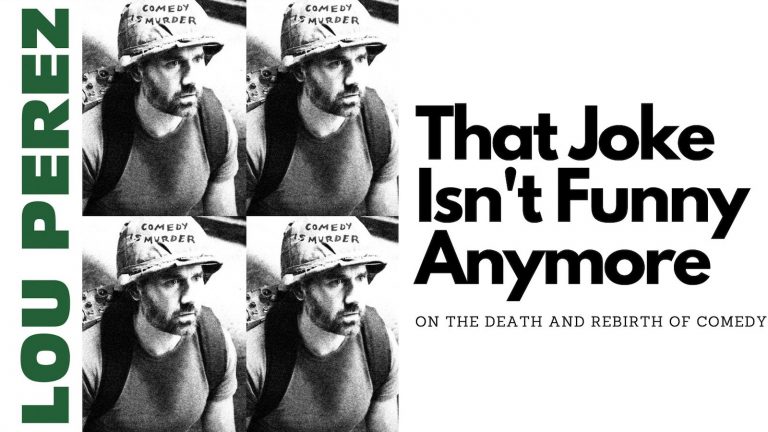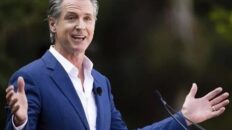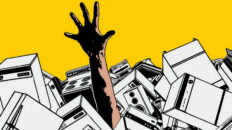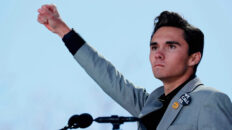The following is an excerpt from Lou Perez’s book, That Joke Isn’t Funny Anymore: On the Death and Rebirth of Comedy.
I wish I could quit social media. Not just a few of the platforms—but the whole thing. The longest I have ever gone without it were the two weeks my wife and I were on our honeymoon in France and Iceland, two countries where it is easy to log off, eat, drink, and try to make a baby.
I realized that life is much happier when lived offline—especially when you don’t feel the need to post the best takes of your happiness for others to see. (Just scroll down my wall for evidence to back up my claim.)
Overall, social media has been great for me though. Chances are if you’re reading this it’s because some coder in Silicon Valley is our nexus. Thanks to those smart men on the spectrum, I have been able to find and build an audience online.
There are downsides, of course. Anyone who has ever been the victim of a social media mobbing or has been cancelled can tell you that.
You know, I don’t think people get fired anymore for being bad at their job. Instead, their employer waits for them to go viral for any of the reasons you do not want to go viral: writing or sharing the wrong tweet or starring in the latest context-free, thirty-second video recorded on a smart phone.
The only thing I like about cancel culture are the career murder/suicides. That’s when the person who gets someone canceled opens him or herself up to scrutiny and ends up getting cancelled too. (Sometimes, by the same mob they whipped up.)
For my purposes, I’ve been thinking a lot about how social media has blurred the line between comedian and civilian—in that it has given non-comedians the opportunity to dip into comedy by tweeting out jokes or sharing memes here and there and then going about their noncomedy lives.
Most of the people I follow online aren’t comedians—and yet they have some of the funniest, most original takes. It’s an added challenge to comics—but a necessary one—to stay fresh.
If comedy is your job, you have to create original material and find new angles on topics that have been hammered to death by other comedians, late-night hosts, and now, Kevin in accounting.
It’s like the Trump challenge to comedians I described earlier in the book—but for everything!
Where this becomes a problem though is now that Kevin in accounting is mixing it up online, it’s like comedians are being judged by the same HR rules that govern Kev’s workplace.
Comedians always have been the ones who can say what you’re not allowed to say in the office. But now you have scolds demanding comics apologize for their work or take down their offending material.
I used to point to The Office as an easy example of the real world versus a fictional world. In the real world, Michael Scott would never make it out of season one of the sitcom with his job intact—but Steve Carrell could make it seven seasons playing the problematic manager at Dunder Mifflin.
We understand the difference between the two worlds. The real world is supposed to punish and stop bad behavior, while the fictional world is supposed to acknowledge the bad behavior and squeeze it for every ounce of funny you can get out it.
Then the most meta thing happened: Comedy Central pulled the “Diversity Day” episode of The Office from its rotation. In case you haven’t seen it—and if you don’t have the DVD box set there’s a chance one day you never will—Michael Scott, a white man, made the braindead, insensitive, socially retarded decision to perform Chris Rock’s legendary N-word-laden routine “Niggas vs. Black People” in the workplace, and in response corporate is forced to send in a diversity lecturer. By today’s standards the episode is problematic—but it’s still hilarious. Just like Rock’s bit (which I will discuss further, later).
The culture is getting silly. Very silly. I know producers who have had to sit through similar lectures as Michael Scott and his Scranton office had to sit through, lest they risk running afoul of workplace harassment laws.
Comedians have had to listen to corporate attorneys explain to them how improper jokes can constitute harassment in the workplace. How intent doesn’t matter—only impact. And how providing a safe and healthy work environment—both on set and in the writer’s room—means being very careful about what you say to your creative partners. Because while you might be okay with teasing one another, a third-party who happens to witness it could take offense. And nobody wants that.
Fortunately, we have more options today and not all of us have to sit through a diversity seminar to make a product or a living, which is why I’ll probably never be able to quit social media. But I will try to live as much life off of it as I can.














Add comment